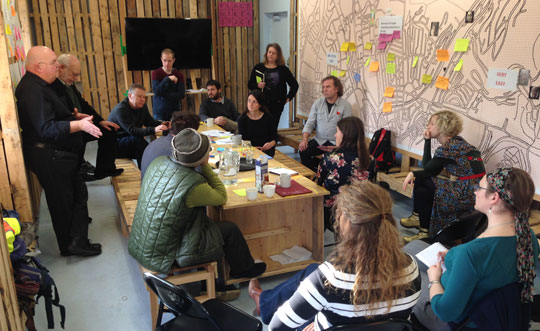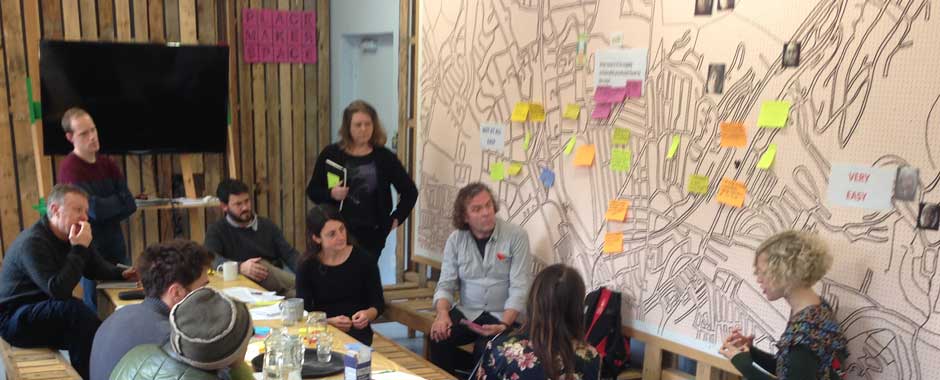Land presents both challenges and opportunities for establishing sustainable food systems. That is one of the learning points from a workshop in Brighton on 7 December 2016. Stakeholders joining the discussions included local small-scale producers, retailers of sustainable produce, non-governmental organisations (Food Matters and The Gaia Foundation), and researchers from the University of Sussex and the Institute of Development Studies.
The workshop was part of the UK case study for the ‘Transformative Pathways to Sustainability’ network funded by the International Social Science Council (ISSC).

Participants discuss the challenges and opportunities for a more sustainable food system. Photo: ESRC STEPS Centre
Localised food systems are conceived as supporting sustainability environmentally, through reduced food miles, and socially, through short value chains connecting society to land, nature, and primary food production.
Informed by an earlier meeting with stakeholders in the food sector in the city, we had decided to focus our research on small to medium-sized farms near Brighton and Hove who use agroecological methods. Since then, we have been conducting interviews with farmers just outside the city to find out their views and some of the challenges they face.
This new workshop gave us the chance to share our findings and discuss how local sustainable food producers could be better connected to consumers and buyers in the city. We also wanted to find out what the participants thought were the obstacles getting in the way of creating a more sustainable food system.
Among the themes discussed were land tenure and access, subsidies, consumer demand, changes in the policy environment and the uncertainties over Europe, local knowledge about where food comes from, and how to enhance the work that is already being done to connect different parts of the food system.
Availability of local land
A major problem that came up in the discussion was access to land. The non-availability of land for small- to medium-sized farms made it difficult to achieve local, agroecological production. In particular, the cost of land and the lack of physical access to space were identified as negative factors.
Land is a topical issue at the moment in the county, as the Borough Council in the nearby town of Eastbourne prepares to sell four downland farms with a total of 3,000 acres of publicly-owned land. The issue has seen rallies in protest against the potential sale, and highlights the role of the Local Authority in land ownership.
Factors which make it easy or difficult to achieve a sustainable food system in Brighton & Hove (click for full size).
At the workshop, policy changes associated with the Local Authority were highlighted as a potential pathway that could support a transformation to sustainable food systems in Brighton & Hove. One participant mentioned that there is enough Council-owned land in the area to produce food for 20,000 to 40,000 people, depending on the type of diet they have. Although Brighton & Hove is fronted by the sea on one side, there is still plenty of land nearby with potential for arable and horticultural production – a potential opportunity for producers.
Moving beyond constraints to increase access
Recognising access to land as an existing constraint for producers, workshop participants thought that collaborating with the local Councils to make land available for producers presented an opportunity.
The issue of land had also come up in our interviews with local agroecological farmers and producers. The constraints on tenant farmers were different from those faced by farmers who own their land, with impacts on the size and type of production. Some farmers had cited the high cost of land as a constraint to access, particularly for small farms which receive little or no financial government support, due to their size.
These discussions, as well as questions asked during an associated workshop on the 6th of December 2016, will inform the next stages for the project. Land will inevitably remain a topic of investigation as the ‘Transformations to Sustainable Food Systems in Brighton & Hove’ project continues.

